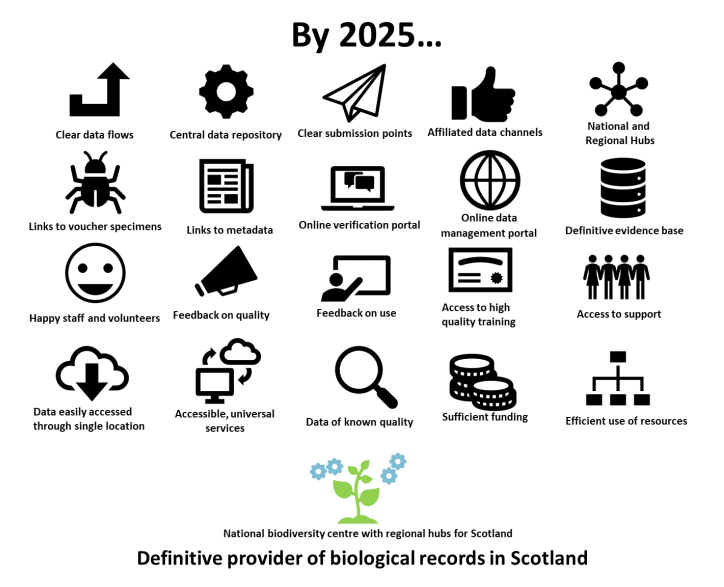Blog written by David Roy, Head of BRC and Martin Harvey, Technical Liaison, Biological Records Centre.
Over 350 years ago, the ‘father of natural history’ John Ray recognised that a complete account of British plants could only be achieved through co-operation. A review of the Biological Recording Infrastructure in Scotland by the Scottish Biodiversity Information Forum (SBIF) takes this lesson on board by adopting a highly collaborative approach. The review’s scope and thoroughness owes a great deal to the leadership of Ellen Wilson at RSPB, whose infectious energy and vision has galvanised the recording community in Scotland to deliver a review with bold ambitions (Figure 1).
The need to act on the recommendations from the SBIF Review have never been more pressing with the recently published landmark new report from the Intergovernmental Science-Policy Platform on Biodiversity and Ecosystem Services (IPBES) giving a stark reminder that nature is declining globally at rates unprecedented in human history.
Figure 1. Aspirations for SBIF outcomes by 2025. https://nbn.org.uk/about-us/where-we-are/in-scotland/the-sbif-review/
BRC’s role in the SBIF review and into the future
Biological Records Centre (BRC) staff (David Roy, Martin Harvey, Oli Pescott, Helen Roy) have welcomed the opportunity to play an active role throughout the SBIF Review, via membership of the SBIF Advisory Group, as interviewees, encouraging volunteers within National Recording Schemes and Societies to contribute questionnaire responses and our involvement in all four workshops held at Scottish Natural Heritage’s Battleby Conference Centre.
Here we give views on some of the outcomes and recommendations of the SBIF Review that have particular relevance to the work of BRC, as a founder member and long-term contributor of the National Biodiversity Network (NBN).
Working in partnership
By way of background, BRC was established in 1964 and aims to provide a focus for terrestrial and freshwater biological recording. In summarising the first fifty years of the Biological Records Centre, it is interesting to reflect that our core activity has remained relatively consistent since 1964: working in partnership with volunteer National Recording Schemes and Societies to collate, manage, disseminate, and interpret species observations (biological records). Throughout our 55-year history, BRC has benefited from a close partnership between the Joint Nature Conservation Committee and the Centre for Ecology & Hydrology as well as playing a major role within the National Biodiversity Network.
There are two key aspects of biological recording, and national recording schemes, that we would emphasise when considering the recommendations of the SBIF Review:
- biological recording and the support requirements are varied;
- most national recording schemes rely almost wholly on volunteer contributions.
We believe that BRC has remained useful because it is built upon synergistic partnerships with the volunteer-recording community rather than as an organisation mandating requirements for biological recording, i.e. it is neither ‘top-down’ nor ‘bottom-up’.
Figure 2. The relationship between ‘professionals’ in the Biological Records Centre (BRC), national recording schemes (mostly volunteer led) and volunteer recorders showing some of the mutual benefits gained by each.
Altered from an original diagram from Pocock et al. 2015, https://onlinelibrary.wiley.com/doi/full/10.1111/bij.12548 to include NBN Atlas infrastructure
The SBIF Review proposes some significant changes in the way we organise biological recording to make best use of the efforts of the many recorders and organisations involved. Its recommendations have great potential to enable BRC and other NBN partners to add value to biological records, and we look forward to playing an important role in working with partner organisations to achieve this.
Efficient data flow is a challenge for citizen science in general and is magnified for biological recording due to its long history, the diversity of individuals and organisations involved and the high level of volunteer involvement.
The SBIF Review rightly recognises that major investment would lead to increased efficiency in data flow, which should result in a more positive outcome for environmental protection and decision-making.
BRC will continue to work towards improved use of technology to enhance the flow of making a record, from observation in the field through to end use and provision of feedback to recorders. In adopting an open science approach, we will work closely with the recording community to identify where we can add most benefit.
The SBIF Review identifies the significant benefits from the streamlining of data collection and dissemination, particularly within Scotland but also for the rest of the UK. Realising the ambition of a central system to locate and access all occurrence data would greatly increase the use of such data for research and conservation.
We will continue to work towards more integrated systems through adoption and development of national and international data standards, together with simple and transparent mechanisms for sharing data. This includes systems that provide excellence to their own community for capturing and verifying biological records.
In preparation for implementing unification of systems, as recommended by the SBIF Review, we support an assessment of the role played by existing systems to evaluate likely efficiencies to be gained and to clearly define the beneficial outcomes.
The long history of biological recording in the UK has provided an inspiring legacy of scientifically rigorous data, for use in biodiversity and environmental research, monitoring and reporting. Technological innovation will continue to facilitate biological recording and will also change what is possible. However, the most important part of biological recording remains the people, their commitment and expertise. We remain committed to the challenge of ensuring high quality data whilst making best use of the time of those willing to collect and verify records.
The time for ‘Transformative changes’
We welcome the SBIF Review in providing such a wide-ranging and thorough assessment of the value of biological recording, and providing some clear options for its future development.
BRC staff have greatly valued the opportunity to contribute to the SBIF Review and look forward to making a major contribution to its success, particularly in helping to represent the interests of many National Recording Schemes and Societies and to increase the use of biological records for research and conservation.
Together, we can ensure that biological recording has a bright future with benefits for people, science and nature. Only though co-operation can we rise to the challenge of the IPBES report for ‘transformative changes’ to restore and protect nature.


